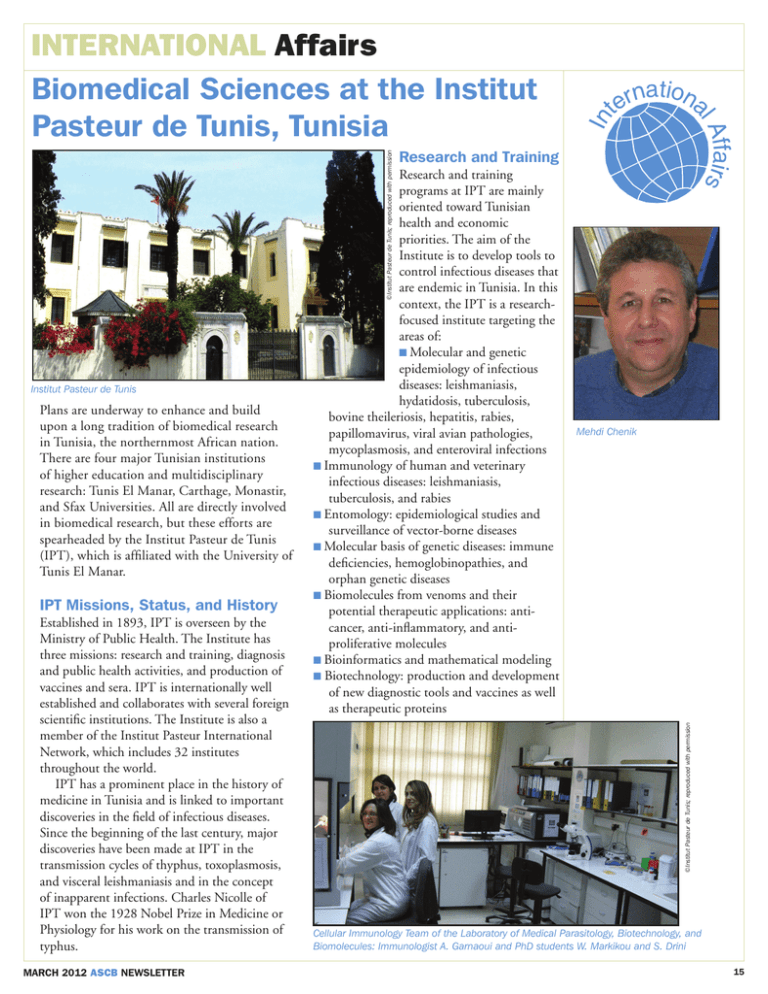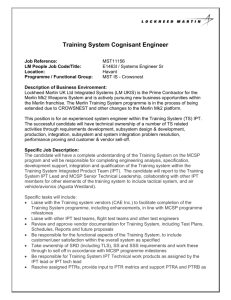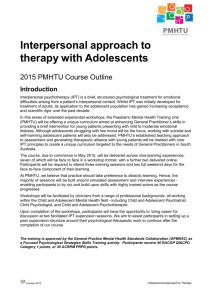INTERNATIONAL Affairs Biomedical Sciences at the Institut Pasteur
advertisement

©Institut Pasteur de Tunis; reproduced with permission Plans are underway to enhance and build upon a long tradition of biomedical research in Tunisia, the northernmost African nation. There are four major Tunisian institutions of higher education and multidisciplinary research: Tunis El Manar, Carthage, Monastir, and Sfax Universities. All are directly involved in biomedical research, but these efforts are spearheaded by the Institut Pasteur de Tunis (IPT), which is affiliated with the University of Tunis El Manar. IPT Missions, Status, and History Established in 1893, IPT is overseen by the Ministry of Public Health. The Institute has three missions: research and training, diagnosis and public health activities, and production of vaccines and sera. IPT is internationally well established and collaborates with several foreign scientific institutions. The Institute is also a member of the Institut Pasteur International Network, which includes 32 institutes throughout the world. IPT has a prominent place in the history of medicine in Tunisia and is linked to important discoveries in the field of infectious diseases. Since the beginning of the last century, major discoveries have been made at IPT in the transmission cycles of thyphus, toxoplasmosis, and visceral leishmaniasis and in the concept of inapparent infections. Charles Nicolle of IPT won the 1928 Nobel Prize in Medicine or Physiology for his work on the transmission of typhus. MARCH 2012 ASCB NEWSLETTER In Research and Training Research and training programs at IPT are mainly oriented toward Tunisian health and economic priorities. The aim of the Institute is to develop tools to control infectious diseases that are endemic in Tunisia. In this context, the IPT is a researchfocused institute targeting the areas of: n Molecular and genetic epidemiology of infectious diseases: leishmaniasis, hydatidosis, tuberculosis, bovine theileriosis, hepatitis, rabies, papillomavirus, viral avian pathologies, mycoplasmosis, and enteroviral infections n Immunology of human and veterinary infectious diseases: leishmaniasis, tuberculosis, and rabies n Entomology: epidemiological studies and surveillance of vector-borne diseases n Molecular basis of genetic diseases: immune deficiencies, hemoglobinopathies, and orphan genetic diseases n Biomolecules from venoms and their potential therapeutic applications: anticancer, anti-inflammatory, and antiproliferative molecules n Bioinformatics and mathematical modeling n Biotechnology: production and development of new diagnostic tools and vaccines as well as therapeutic proteins Mehdi Chenik ©Institut Pasteur de Tunis; reproduced with permission Institut Pasteur de Tunis nationa r e t fai l Af rs INTERNATIONAL Affairs Biomedical Sciences at the Institut Pasteur de Tunis, Tunisia Cellular Immunology Team of the Laboratory of Medical Parasitology, Biotechnology, and Biomolecules: Immunologist A. Garnaoui and PhD students W. Markikou and S. Drini 15 n Preclinical and clinical trials: testing new biomolecules targeting infectious diseases IPT research activities are conducted in nine laboratories where 108 scientists collaborate with 164 master’s degree and PhD students. The availability of staff with different educational backgrounds (MD, PhD, PharmD, and VetMD) and from different disciplines provides a unique spectrum of competencies that allows a multidisciplinary approach to research and development. Laboratory research activities are carried out in the framework of specific national and international programs funded by various governmental bodies (e.g., the Ministry of Public Health and the Ministry of Higher Education and Scientific Research) as well as by nongovernmental bodies and donor agencies. Funding sources include the World Health Organization’s (WHO’s) TDR program for research and training in tropical diseases, the WHO Eastern Mediterranean Research Office together with the Standing Committee for Science and Technology of the Organization of Islamic Countries, the U.S. National Institutes of Health, the European Union, the International Atomic Energy Commission, the Wellcome Trust, and the Institut Pasteur International Network. IPT holds 14 international patents and published 129 articles in national and international publications in 2010. That represents a 215% increase since 2005. Diagnosis, Public Health, and Manufacturing IPT’s public health activities mainly involve biomedical analyses related to human and animal infections. These are conducted in 18 laboratories, where biochemistry, hormonology, toxicology, hematology, immunology, genetic diseases, cellular pathology, and food control techniques are performed. IPT hosts several national reference centers (for rabies, poliomyelitis, measles, and bacteria) and international reference centers (for poliomyelitis, measles, and human papillomavirus). IPT is also a WHO Collaborating Center for research and training on leishmaniasis. IPT is an international center for vaccination and a center for rabies treatment. It is the only producer of vaccines and sera for human use in Tunisia. Its production is conducted according to current best manufacturing practices and is focused on BCG and antisera (anti-rabies, anti16 scorpion, and antiviper). Recently, IPT was named an African Network for Drugs and Diagnostics Innovation (ANDI) Center of Excellence for Bio-molecule Discovery, one of 32 ANDI Centers for Excellence in health innovation. Prospects IPT plans to consolidate and expand its areas of expertise in the coming years through innovative strategies for research and development. The goals are to complement existing technology and generate new fields of expertise, enhance flexibility with a bottomup strategy for managing laboratories, improve work conditions to boost innovation, and promote public–private partnership in biotechnology applied to health. Efforts to develop translational and clinical research programs (including clinical trials) will also be one of the main targets of IPT as it seeks more rapid realization of benefits to patients. Moreover, IPT plans to further develop its technical expertise in areas such as sequencing, flow cytometry, biofermentation, microscopy, genomics, and proteomics. Finally, to promote its laboratories, IPT plans to disseminate information about the value of its products, processes, know-how, and research results. Thus the Institute continues its tradition of promoting health through research. n —Mehdi Chenik, Hichem Ben Hassine, and Hechmi Louzir, Institut Pasteur de Tunis Note Here are some useful links to websites of Tunisian institutions: IPT www.pasteur.tn Tunisian Ministry of Higher Education and Scientific Research www.mes.tn University of Tunis El Manar www.utm.rnu.tn Carthage University www.ucar.rnu.tn Monastir University www.um.rnu.tn Sfax University www.uss.rnu.tn ASCB NEWSLETTER MARCH 2012



